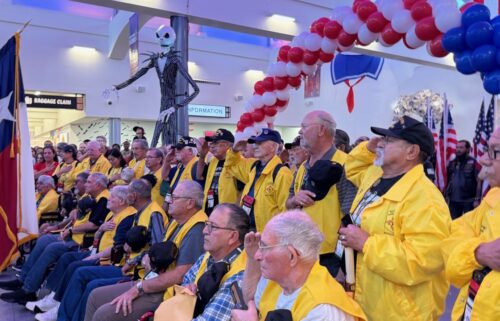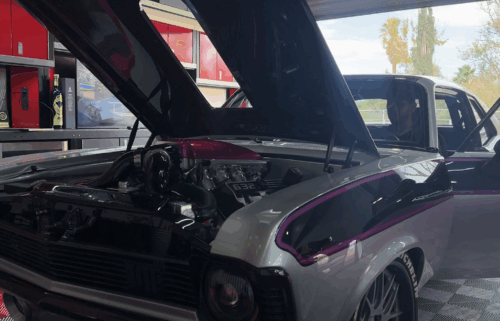What we learned from the Uvalde shooting video, and what remains unknown
CNN
By Ray Sanchez and Peter Nickeas, CNN
The gunman walked into the Uvalde, Texas, elementary school and casually pushed back his long hair before moving to adjoining classrooms where he killed 19 students and two teachers, according to edited portions of surveillance video of the law enforcement response.
The 82 minutes of disturbing footage from the massacre at Robb Elementary School show police officers, some armed with rifles and ballistic shields, massed in a hallway for more than an hour before entering a classroom and killing the gunman.
At one point officers approached the classroom doorway, within minutes of the shooter entering the school unimpeded. They then made a hasty retreat after the gunman opened fire with his semi-automatic rifle.
The video sheds no light on why officers waited so long to confront the gunman, nor does it reveal who was responsible for the delay. In fact, days after its publication by the Austin American-Statesman, the video raises more questions than answers.
The gunman appeared to do most of the shooting between the time he entered the classrooms and when the officers approached the classroom minutes later only to retreat under a barrage of gunfire.
Here’s what the video revealed about the heavily criticized and perplexing police response — and the key questions still unanswered as a Texas House of Representatives investigative committee is set to release its preliminary report on Sunday.
A delayed entry and retreat under fire
In the first edited video, which is just over four minutes long, audio captures frantic teachers screaming as the gunman crossed the parking lot after crashing a truck near the school campus.
He entered the school at 11:33 a.m. on May 24, turned down a hallway carrying a semi-automatic rifle — his face briefly shown — and walked into a classroom, where he again opened fire, unleashing dozens of rounds.
When the shots rang out, a student who had been peeking around the hallway corner at the gunman quickly turned and ran away. Multiple bursts of gunfire echoed through the corridors for nearly three minutes. The American-Statesman edited the footage to blur at least one child’s identity and to remove the sound of children screaming. The victims are not shown.
About three minutes after the shooter entered, at least nine officers made what appeared to be a coordinated entry into the building. This was about 10 seconds after the last volley of shots can be heard from the classrooms — which was followed by a long pause.
At least two officers entered from one end of the hallway, and seven in single file from the other. The video showed, for the first time, how quickly officers were at the scene and near gunfire.
“That’s an amazing response time,” said Bill Francis, a former FBI agent who was a leader on the bureau’s elite hostage rescue team for 17 years. “What happens next is where things kind of go awry.”
At least three officers, two carrying rifles, immediately made their way toward the classroom door, crouching down for cover.
Rather than forcing their way through the door — which would have been the widely accepted next step in an active-shooter situation and where it’s near certain the officers would have taken fire — they held outside the door until additional gunfire is heard.
From the video alone the direction of the gunfire from the classroom in unclear, though officials have previously said officers took fire when they first approached the door.
“They’re right there,” Francis said of the three officers seen near the classroom. “They’re receiving gunfire. At that point you just have to win the fight. You have to get in that room and you have to eliminate the threat and that’s established doctrine.”
Instead, the officers retreated down the hallway to a spot just below the surveillance camera. One officer grabbed the back of his head.
“The safety priorities we teach … are to overcome that sort of primal instinct of self-preservation and push through it to address the threat, to engage the threat,” said Thor Eells, executive director of the National Tactical Officers Association, referring to the initial missed opportunity to confront the shooter.
“It does require that we would have to go into harm’s way in order to do that and that was the opportunity between two, three, four (officers) there to begin to engage that suspect with gunfire.”
Active shooter training holds, generally, that delays in confronting a gunman can cost civilians their lives and officers should move toward the gunfire, alone if needed, to stop the killing, according to experts. A rapid confrontation can save lives.
“They forfeit the chance for kids that are wounded, bleeding inside there, perhaps to be saved and more kids to be shot at that point. To me that’s the biggest failure right there,” Francis said of the officers’ decision to pull back from the gunfire.
The retreat came at a crucial moment in the siege and raises questions about the training of the officers, according to experts who watched the video.
“The officers do turn their back to the door and they run down the hallway and the shooter, if he wanted to, easily could have opened that door and killed all those officers,” Francis said. “They simply turn and run away from the gunfire. It’s just unfortunate because at that point they lose all momentum.”
Slain teacher’s husband was among first responders
Officers in body armor, some carrying ballistic shields, are seen milling about in the school hallway while the gunman occupied adjoining classrooms.
Police body camera video, included in the footage, showed two officers fist bump at one point. An officer is seen in another clip using a hand sanitizer dispenser mounted on a wall.
Early in the siege, one officer is seen checking his phone, which prompted criticism in some quarters until a local politician provided some important context.
State Rep. Joe Moody, one of three House Investigative Committee members looking into the law enforcement response, tweeted that the officer is Ruben Ruiz of the Uvalde School District Police — the husband of teacher Eva Mireles, who was shot and killed.
The teacher contacted her husband on the phone while he stood with gun in hand down the hallway to say she was dying, according to Moody.
Mireles was a fourth grade teacher. She’d been an educator for 17 years, her family has said. Seconds after being seen on the phone, the video shows Ruiz walking out of camera view. He returns moments later and speaks with other officers.
Ruiz was eventually removed from the building after trying to intervene, according to Moody.
“He attempted to engage but was removed from the building and disarmed,” Moody said. His attempt to engage the shooter and his removal from the building are not visible.
The Uvalde County coroner’s office hasn’t released information about the deaths that day and public officials haven’t commented on how many children may have died while officers waited outside and inside the building.
During the siege, children made multiple phone calls to the police as officers waited in the hallway. An 11-year-old girl who survived said she smeared herself in the blood of a dead classmate and played dead.
Steve Ijames, who headed a SWAT unit in Missouri and is now a consultant on law enforcement tactics, said the video does not reveal whether some officers tried to engage the shooter on their own.
“I’ve got to believe some people are turning to others and saying, ‘What do we exist for? What are we doing?’ ” Ijames said.
“The overriding question when you watch the video is, ‘Why aren’t you doing your job?’ There’s lots of cops pointing guns down the hall as though they’re expecting this guy to come running out. The idea that we just stand there with bunkers and shields and rifles and helmets and do nothing is just incomprehensible.”
Ijames is surprised one of the officers in the video “didn’t just say, f—- this, we’re going in.”
Video sheds no light on role of agencies at the scene
It’s not clear from the video alone which agencies the officers belonged to or who was in command, though the investigative report to be released this weekend could provide answers.
The Texas Department of Public Safety has said the officer in charge was the school district’s police chief, Pedro “Pete” Arredondo, who has been slammed by the slain children’s parents, local leaders and law enforcement officials.
The DPS has said Arredondo misclassified the siege as a barricade situation, which — unlike an active shooter report — calls for a more measured response.
Arredondo has said he neither considered himself the incident commander nor instructed officers to refrain from breaching the classrooms. He resigned the Uvalde City Council seat he assumed just a week after the attack.
At least three federal, two state and three local agencies responded to the carnage at Robb Elementary. The video sheds no light on the role of ranking officers from other agencies.
“We don’t know what these other leadership folks that arrived after the initial chief arrived, what their interaction was with that chief, but there’s a lot of folks that could have stepped up and taken charge that were actually in the hallway,” Francis said.
Many of at least eight agencies whose officers responded to the school that day haven’t responded to CNN requests for comment. Others have declined comment about their role in the response.
Uvalde County District Attorney Christina Mitchell Busbee said in a statement last month that the shooting was being investigated by the FBI and Texas Rangers. She said that “any release of records to that incident at this time would interfere with said ongoing investigation and would impede a thorough and complete investigation.”
Busbee has also objected to the release of video, according to the Texas DPS. The district attorney has not responded to CNN requests for comment.
DPS Director Col. Steven McCraw last month criticized the delayed police response as an “abject failure,” citing in part evidence from the hallway surveillance video.
“This was certainly a mess,” said Francis, referring to the law enforcement response. “There’s plenty of blame to go around.”
The video does not reveal what was happening with the police response outside the school.
“What’s going on outside that classroom and other breach points — windows and things like that?” Francis asked.
“A lot of times we would set up to engage subjects from windows… Whether the subject could be engaged from any of those points at least the video obviously doesn’t really address that.”
Other video of officers both inside and outside the building have not been made public.
“We haven’t seen any of that and that’s why I think there’s a lot of information that could potentially explain why there’s not as much activity going on inside if there’s something that (officers inside) were being briefed or advised was taking place on the exterior,” said Eells, the executive director of the National Tactical Officers Association.
“I’m not sure, without having the benefit of interviewing and speaking to the officers that were on scene, what they were thinking and why they were so singularly focused on remaining in the interior and trying to get the suspect from that perspective, versus using the exterior — which would have been a lot easier to do and potentially even faster to do.”
At 12:21 p.m., a group of officers, including US Border Patrol agents in tactical gear, moved down the hall in formation.
Again they waited — this time until 12:50 p.m. — to breach the classroom and kill the gunman.
A volley of gunfire signaled the end of one of the deadliest school shootings in US history, just two days before the summer break. The confrontation with the gunman is not shown.
Moments later, the video ends.
“One of the biggest things that’s likely to change here is recognizing the need for leadership and command level or supervisory level personnel being better trained, better equipped to make decisions in critical incidents,” Eells said. “You don’t have minutes to make decisions. You have seconds.”
The-CNN-Wire
™ & © 2022 Cable News Network, Inc., a WarnerMedia Company. All rights reserved.
CNN’s Rosa Flores, Rosalina Nieves and Elizabeth Wolfe contributed to this report.




